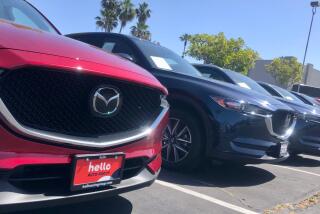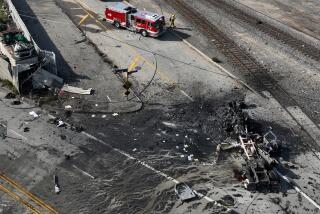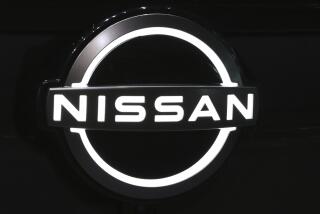Takata, Honda face class-action lawsuit over faulty air bags
- Share via
The national law firm that negotiated one of the largest class-action settlements ever against an automaker has filed suit against Japanese auto parts supplier Takata Corp. and Honda Motor Co. over the installation of faulty air bag inflators in millions of vehicles in the United States.
The complaint, filed Thursday in federal court in Los Angeles by Hagens Berman Sobol Shapiro, seeks class-action status and claims Takata cut corners to build cheaper air bags and that Honda purchased the parts to slice its manufacturing expenses.
The suit alleges “the result is that instead of saving lives, faulty Takata air bags in Honda automobiles are killing and maiming drivers and passengers involved in otherwise minor and survivable accidents.”
The lawsuit seeks to collect economic damages for vehicle owners — including reimbursement for the decline in value of millions of cars allegedly caused by the air bag scandal.
The Berman firm has successfully negotiated similar claims, including a $1.6-billion class-action settlement with Toyota that is among the largest paid by an automaker. It applied to numerous suits claiming damages caused by safety defects related to incidents of unintended acceleration in the automaker’s vehicles.
Like this latest case, that lawsuit did not address personal injury and wrongful-death claims.
The Seattle firm also was recently named co-lead counsel in the class-action lawsuit against General Motors Co. over faulty ignition switches and loss of vehicle value.
In the Takata case, the suspect air bags were assembled with or included parts made in two Takata factories in the U.S. and Mexico. They were installed in vehicles made by Honda, Toyota, Mazda, Nissan, Mitsubishi, Subaru, Chrysler, Ford and BMW — with Hondas making up the bulk of the list — in various model years ranging from 2000 to 2008.
Automakers have already recalled many of the cars with the suspect air bags.
“We’re talking about a critical vehicle safety component that makes the difference between life or death in an automobile accident,” said Steve Berman, managing partner at Hagens Berman. “Consumers deserve far more from Takata and Honda — two parties that have clearly let safety take a backseat to profits.”
The suit seeks to represent drivers who purchased or leased a Honda vehicle with a defective Takata air bag and that has been subject to an air bag-related warning or recall.
“Honda has not been served with the lawsuit and can’t comment on it at this time,” said spokesman Chris Martin. “We are focused on the core issue of repairing our customer vehicles.”
Martin said Honda owners who have received a recall notice should get their cars repaired.
Takata spokesman Alby Berman said, “Company policy is not to comment on ongoing litigation.”
Earlier this month the National Highway Traffic Safety Administration issued two rare alerts, telling owners that certain early 2000s models of vehicles made by Honda and other manufacturers were subject to explosions of their passenger-side air bags.
The first warning was for 4.7 million vehicles, with particular emphasis on cars in hot, humid climates, where the incidents are most frequent. Owners of the affected vehicles were told to see their dealers as soon as possible.
The second warning increased the number of affected vehicles to 7.8 million. It included stronger language encouraging owners of affected vehicles to stop driving their cars until they could be inspected by their dealers.
Vehicle owners concerned about their cars can visit NHTSA’s website and choose the “Search by VIN” option to use their car’s vehicle identification number to determine whether it is at risk.
The actions by many automakers to limit their recalls to cars located in areas with hot, humid weather has caused confusion and might not fully address the problem, said Clarence Ditlow, executive director of the Center for Auto Safety. Honda is recalling cars in more states than other manufacturers, an indication that the problem might have a wider geographic distribution.
“The agency is all over the map on what states are affected,” Ditlow wrote in a letter to NHTSA on Thursday. “How can Honda have more high-humidity states than other manufacturers?”
Sens. Ed Markey (D-Mass.) and Richard Blumenthal (D-Conn.) also have criticized how NHTSA has handled the air bag problem. They want the agency to issue a nationwide recall on all vehicles suspected of being equipped with the defective air bags, regardless of the climate of the state where the cars are registered.
Ditlow said other factors are adding to the confusion. Some car companies are treating the problem as a “service action” rather than a full-fledged recall. There’s also confusion about how driver and passenger air bags may be differently affected.
“The Center for Auto Safety is deeply troubled by NHTSA’s secrecy and conflicting messages on deadly Takata air bags,” he said.
The Berman complaint claims that Takata knew of the deadly air bag defect at least 13 years ago, first seeing the problem in an Isuzu vehicle but failing to take action.
Honda learned of the problem in 2004 when the air bag in an Accord exploded in Alabama, shooting out metal shrapnel and severely injuring the car’s driver, the suit said. Honda and Takata decided that the malfunction was “an anomaly” that did not warrant an investigation, recall and involvement of federal safety regulators, according to the lawsuit.
Last month Hien Tran of Florida died after her 2001 Accord struck another car in Orlando and the Takata air bag exploded, sending shrapnel into her neck. The medical examiner stated that the shrapnel tore through the air bag, causing stab-type wounds that cut her trachea, the lawsuit said. Because of the stab wounds, the death was first investigated as a homicide by detectives.
A week after she died Tran received a letter from Honda urging her to get her car fixed because of faulty air bags that could explode, according to the lawsuit.
Follow me on Twitter (@LATimesJerry), Facebook and Google+.







